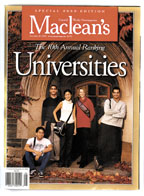|
by Cameron Tilson,
Senior Planning and Policy Analyst, Rector’s Cabinet
In the Maclean’s magazine rankings of Canadian universities,
published November 13, Concordia was ranked ninth out of 11 universities
in its category, an improvement over last year’s 10th out of 12.
Concordia is placed by Maclean’s in the “comprehensive”
category, for institutions with significant research and a wide range
of graduate and undergraduate programs, including professional degrees.
The leader in this category was Simon Fraser University, followed by Guelph,
Waterloo, Victoria and York.
This year’s rankings reflect Concordia’s teaching strengths,
accessibility, growing research profile, successful capital campaign but
also, unfortunately, our continuing funding difficulties. We improved
our ranking in seven categories, dropped slightly in four, and stayed
the same as last year in 10.
Here are the areas in which we improved our standing:
· Average entering grade of students (11th to 10th)
· Proportion of students who graduate (10th to eighth)
· First-year classes taught by tenured or tenure-track faculty
(12th to 10th)
· Social sciences, humanities and fine arts grants (third to second)
· Medical and science grants (seventh to sixth)
· Alumni support (sixth to fourth)
· Reputational survey (ninth to eighth)
In the following categories, we did not improve in the rankings, although
our performance was better than in 1999:
· Proportion of students with an incoming average of at least 75
per cent (69.3 per cent to 70.9 per cent)
· Proportion of international graduate students (16.3 per cent
to 16.8 per cent)
· Faculty with PhDs (90.6 per cent to 91 per cent)
· Proportion of operating budget expended on student services (3.9
per cent to 4.2 per cent)
Our strengths continue to be:
· Accessibility: Although admission to many programs is very competitive
and attracts high-ranking students, Concordia remains largely an accessible
and welcoming university. As a result, the incoming average of our applicants
has remained steady around 76 per cent for the past several years. However,
the proportion of our applicants with an incoming average of at least
75 per cent continues to increase, from 58.2 per cent in 1995 to 70.9
per cent in 2000. This confirms the fact that we are admitting greater
numbers of high-ranking students.
· Program appeal: We continue to attract large numbers of students
from other provinces; it is estimated that about 53 per cent of the out-of-province
students apply to programs with competitive admissions policies.
· Small class size: We continue to be ranked near the top of this
category.
· Research grants: Continued improvement by our researchers in
obtaining funding. As recently as 1998, we were ranked seventh out of
12 in the Social Sciences/Humanities area. We are now second. In the Science/Medical
category, we were ranked ninth out of 11 as recently as 1996. We’re
now ranked sixth.
· Alumni support: The continuing support shown by our graduates
in making donations to the university has moved us to fourth position.
Areas in which improvement is needed are the financial categories:
· We remain far behind other universities in the amount of operating
expenditures per weighted full-time-equivalent student. This is the cumulative
result of years of cuts to our operating grant from the government of
Québec.
· We are still unable to offer a competitive level of scholarships
and bursaries to our students. However, this situation has been improving,
thanks to our last capital campaign.
· As a direct consequence of the financial situation, the funds
available to our libraries for services and acquisitions are low relative
to other universities.
Our financial situation should improve as the Ministry of Education begins
to reinvest in post-secondary education. For the time being, we will continue
to concentrate on the things that we do best: provide good, accessible
programs to our students.
Whether we agree with some of the criteria or not, the annual Maclean’s
survey is an exercise in public accountability. It should also be noted
that there is no other systematic collection of data for Canada-wide comparisons
between universities; for example, comparison of graduation rates. For
this reason, we will continue to participate in the Maclean’s
survey, and we hope that Concordia will continue to see improvement in
the rankings.
Cameron Tilson is responsible for compiling the data for the Maclean’s
survey. He can be reached at 848-7976, ctilson@alcor.concordia.ca.
|




